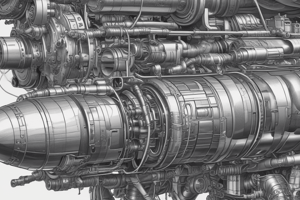Podcast
Questions and Answers
What is the primary purpose of lubrication in machinery?
What is the primary purpose of lubrication in machinery?
- To increase friction between moving parts
- To prevent surfaces from coming into direct contact (correct)
- To facilitate thermal conduction between components
- To enhance the density of the materials involved
Which of the following is not a purpose of using lubricants?
Which of the following is not a purpose of using lubricants?
- Friction increase (correct)
- Corrosion reduction
- Wear reduction
- Temperature control
How do lubricants primarily minimize wear between bearing surfaces?
How do lubricants primarily minimize wear between bearing surfaces?
- By facilitating direct metal-to-metal contact
- By enhancing the heat conduction of surfaces
- By evaporating quickly during operation
- By forming a barrier that prevents direct contact (correct)
What is the effect of viscosity on lubrication?
What is the effect of viscosity on lubrication?
Which additive is commonly used in lubricants for corrosion protection?
Which additive is commonly used in lubricants for corrosion protection?
What is the primary purpose of anti-oxidants in lubricating oils?
What is the primary purpose of anti-oxidants in lubricating oils?
Which characteristic is essential for turbine oils?
Which characteristic is essential for turbine oils?
What may happen if the viscosity of air compressor cylinder oils is too low?
What may happen if the viscosity of air compressor cylinder oils is too low?
How does the pour point depressant function in lubricating oils?
How does the pour point depressant function in lubricating oils?
What is the consequence of carbon residue in lubricating oils?
What is the consequence of carbon residue in lubricating oils?
What role do detergent-dispersants play in lubricating oils?
What role do detergent-dispersants play in lubricating oils?
Which additive is specifically used to prevent foam formation in lubricating oils?
Which additive is specifically used to prevent foam formation in lubricating oils?
What is floc point in the context of lubricating oils?
What is floc point in the context of lubricating oils?
What is the primary function of solid lubricants?
What is the primary function of solid lubricants?
What characteristic is essential for lubricants used in environments with high pressures?
What characteristic is essential for lubricants used in environments with high pressures?
Which of the following is a common application for semi-solid lubricants?
Which of the following is a common application for semi-solid lubricants?
How does viscosity affect lubrication in machinery?
How does viscosity affect lubrication in machinery?
What function do lubricant additives serve?
What function do lubricant additives serve?
Which factor does NOT influence the choice of lubricant class?
Which factor does NOT influence the choice of lubricant class?
What is one of the essential services that lubricants must provide?
What is one of the essential services that lubricants must provide?
When are solid lubricants typically preferred over other types?
When are solid lubricants typically preferred over other types?
Flashcards are hidden until you start studying
Study Notes
Lubrication and Oil Properties
- Lubricating oils oxidize in service, resulting in acid formation.
- Carbon residue indicates the potential carbon formation in oils at high temperatures, which can hinder engine performance and damage rings and valves.
- Floc point is the temperature at which wax or other particles separate from oil.
Lubricant Additives
- Anti-oxidants: Prevent oxidation, reducing corrosion and sludge buildup.
- Detergent-dispersants: Keep potential deposits in suspension.
- Viscosity index improvers: Minimize viscosity changes due to temperature fluctuations.
- Antifoam agents: Neutralize air or vapor bubbles in oil.
- Pour point depressants: Lower the pouring temperature of the oil.
- Corrosion inhibitors: Form protective films on metal surfaces to combat corrosion.
Selecting Lubricating Oils
- Turbine Oils: Serve as lubricants, cooling agents, and sealants; require good water separation and additives for corrosion, antifoaming, and oxidation prevention.
- Air Compressor Cylinder Oils: Must have appropriate viscosity; too high causes drag, too low fails to seal properly; should maintain low carbon residue.
- Internal Combustion Engine Oils: Must withstand high temperatures, resist evaporation, and prevent carbon buildup; essential for creating seals between pistons and cylinder walls.
Classes of Lubricants
- Classification depends on surface nature, load, speed, and operating temperature.
- Essential lubricant services include:
- Low coefficient of friction for efficient movement.
- High adhesion to surfaces being lubricated.
- Stability under varying conditions (temperature and pressure).
- Resistance to oxidation and emulsification.
- Maintenance of fluidity at low temperatures.
Types of Lubricants
- Solids: Include graphite, soapstone, and molybdenum disulfide; suited for extreme temperatures and heavy loads, often used in difficult-to-service applications.
- Semi-solids: Greases made from liquid lubricants mixed with thickening agents.
Lubrication Principles
- Lubrication prevents direct contact between bearing surfaces to reduce wear and tear.
- Lubricant separates surfaces, allowing smooth motions without direct metallic contact, thus minimizing wear.
- Fluid friction occurs when layers of lubricant slide over each other.
Purposes of Lubricants
- Reduce friction: Most critical purpose.
- Diminish wear on surfaces.
- Protect against corrosion.
- Aid in temperature control.
- Absorb shocks and impact forces.
Studying That Suits You
Use AI to generate personalized quizzes and flashcards to suit your learning preferences.




